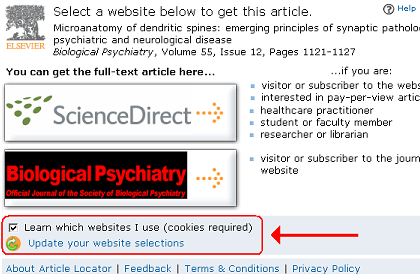Wouldn’t it be nice if the MPG/SFX service menu for a specific journal article includes a link to the corresponding record in the Web of Science – to provide you with an easy option to lookup cited references, citing articles and related publications? It took us a while to implement, but we finally came up with this:

Example MPG/SFX menu: http://tinyurl.sfx.mpg.de/q45l
The target title ("Web of Science") links to the appropriate full record view and the "Times Cited" count to the citing articles page in the Web of Science (WoS). Please note that access to the WoS database requires a subscription, but all users from the Max Planck Society should have access from their workplace.
The above information is fetched on request by using Thomson Reuters new Links Article Match Retrieval Service (AMR). Our implementation for SFX is a bit preliminary and the service fails to identify the WoS record under certain circumstances (e.g inaccurate or incomplete metadata). Some detailed testing will be done next week, but your feedback is always welcomed!

 link resolver on two additional information platforms:
link resolver on two additional information platforms:
 and “blank”).
and “blank”).
